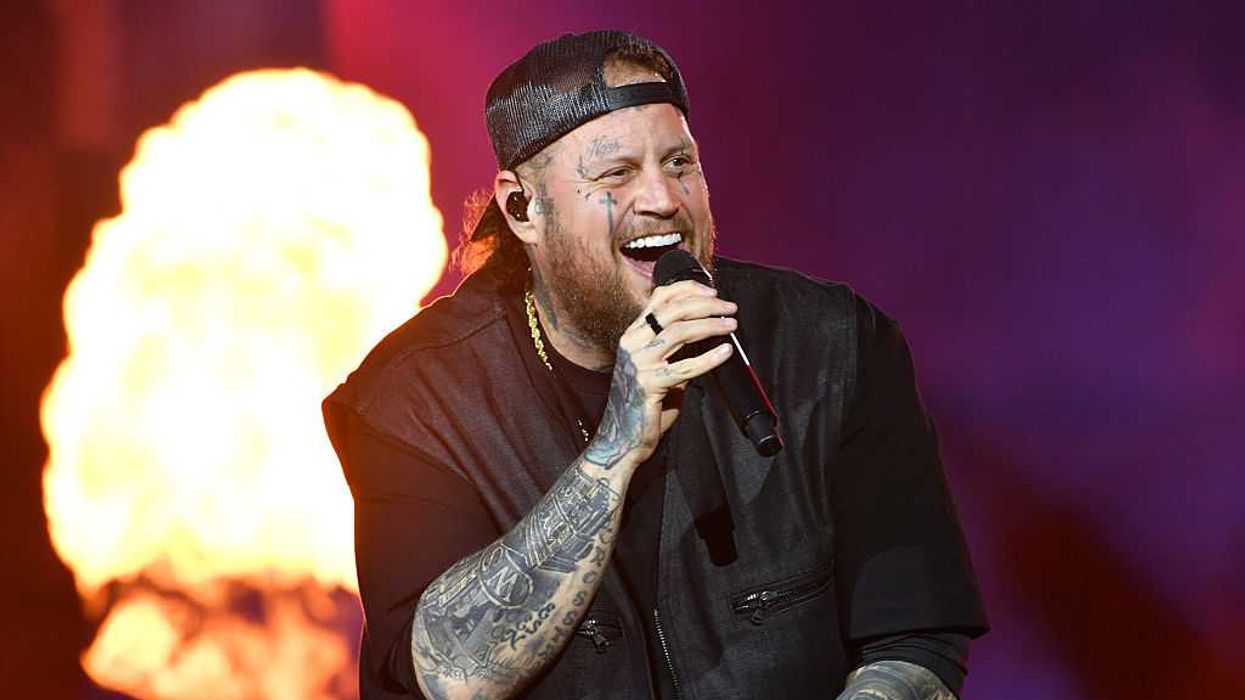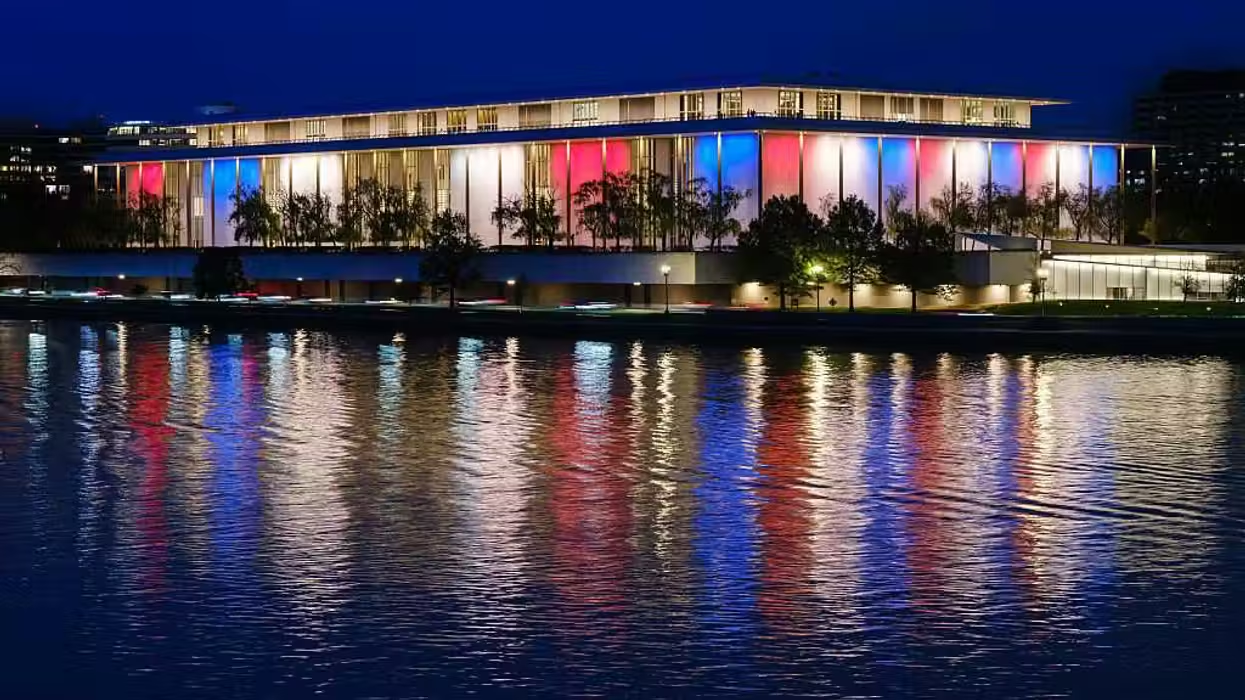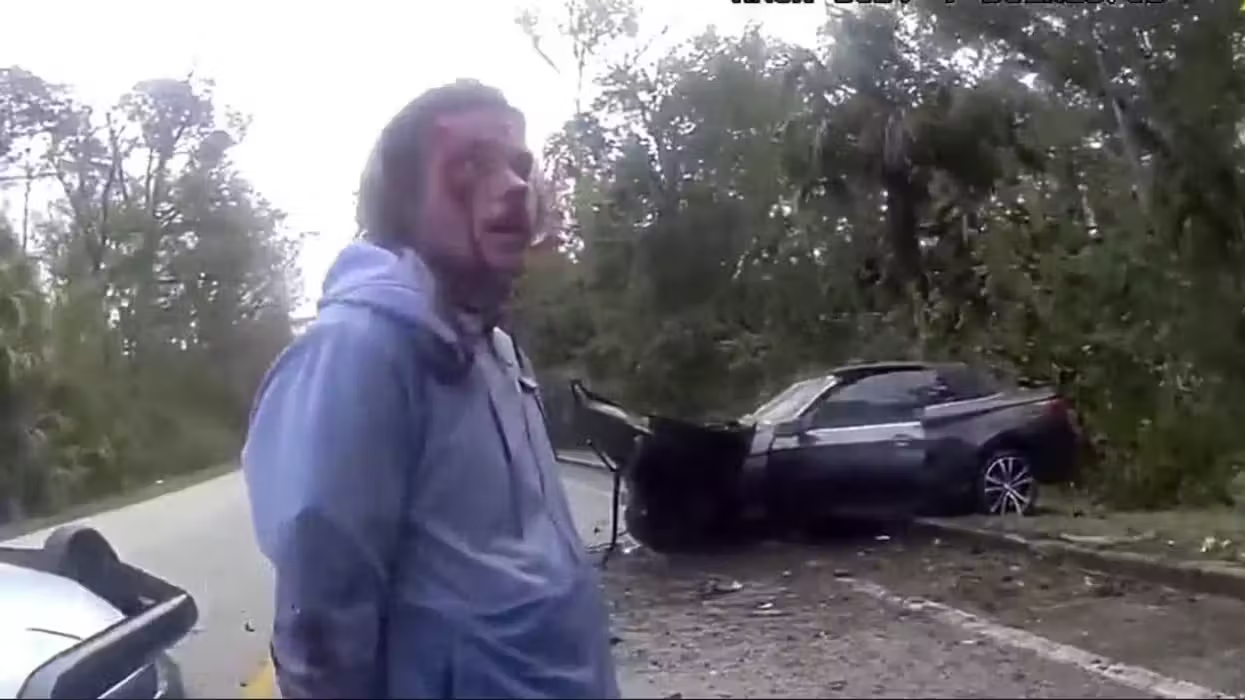MURSITPINAR, Turkey (AP) -- Islamic State fighters were poised to capture a strategic Syrian town on the Turkish border, Turkey's president warned Tuesday, even as Kurdish forces battled to expel the extremists from their footholds on the outskirts.
The outgunned Kurdish fighters struggling to defend Kobani got a small boost from a series of U.S.-led airstrikes against the militants that sent huge columns of black smoke into the sky. Limited coalition strikes have done little to blunt the Islamic State group's three-week offensive, and its fighters have relentlessly shelled the town in preparation for a final assault.
 SANLIURFA, TURKEY - SEPTEMBER 28: Smoke is seen rising from the Syrian Kurdish town of Kobani following an explosion that was followed by further fighting, which saw IS fighters shoot into Turkey for the first time on September 28, 2014 south of Sanliurfa, Turkey. Islamic State (IS, also called ISIS and ISIL) fighters are reportedly advancing with heavy weaponry on the strategic Kurdish border town of Kobani (also called Ayn Al-Arab), which they have surrounded on three sides. Several hundred thousand refugees are reportedly in Kobani and aid agencies are bracing for a massive exodus into Turkey. Carsten Koall/Getty Images
SANLIURFA, TURKEY - SEPTEMBER 28: Smoke is seen rising from the Syrian Kurdish town of Kobani following an explosion that was followed by further fighting, which saw IS fighters shoot into Turkey for the first time on September 28, 2014 south of Sanliurfa, Turkey. Islamic State (IS, also called ISIS and ISIL) fighters are reportedly advancing with heavy weaponry on the strategic Kurdish border town of Kobani (also called Ayn Al-Arab), which they have surrounded on three sides. Several hundred thousand refugees are reportedly in Kobani and aid agencies are bracing for a massive exodus into Turkey. Carsten Koall/Getty Images
Warning that the aerial campaign alone was not enough to halt the Islamic State group's advance, Turkish President Recep Tayyip Erdogan called for greater cooperation with the Syrian opposition, which is fighting both the extremists and forces loyal to Syrian President Bashar Assad.
"Kobani is about to fall," Erdogan told Syrian refugees in the Turkish town of Gaziantep, near the border. "We asked for three things: One, for a no-fly zone to be created; Two, for a secure zone parallel to the region to be declared; and for the moderate opposition in Syria and Iraq to be trained and equipped."
Erdogan's comments did not signal a shift in Turkey's position: He has said repeatedly that Ankara wants to see a more comprehensive strategy for Syria before it commits to military involvement in the U.S.-led coalition.
Turkish tanks and other ground forces have been stationed along the border within a few hundred yards of the fighting in Kobani, also known as Ayn Arab, but have not intervened. And while Turkey said just days ago that it wouldn't let Kobani fall, there's no indication the government is prepared to make a major move to save it.
Since mid-September, the militant onslaught has forced some 200,000 people to flee Kobani and surrounding villages, and activists say more than 400 people have been killed in the fighting. It has also brought the violence of Syria's civil war to Turkey's doorstep.
Capturing Kobani would give the Islamic State group, which already rules a huge stretch of territory spanning the Syria-Iraq border, a direct link between its positions in the Syrian province of Aleppo and its stronghold of Raqqa, to the east. It would also give the group full control of a large stretch of the Turkish-Syrian border.
 SANLIURFA, TURKEY - OCTOBER 07: A photo taken from the Suruc district of Sanliurfa, Turkey shows smoke rises from Ayn al-Arab city (Kobani) of Syria after the US-led coalition bombed the targets of the Islamic State of Iraq and the Levant (ISIL) in Ayn al-Arab, on October 7, 2014. Anadolu Agency/Getty Images
SANLIURFA, TURKEY - OCTOBER 07: A photo taken from the Suruc district of Sanliurfa, Turkey shows smoke rises from Ayn al-Arab city (Kobani) of Syria after the US-led coalition bombed the targets of the Islamic State of Iraq and the Levant (ISIL) in Ayn al-Arab, on October 7, 2014. Anadolu Agency/Getty Images
Syrian Kurds scoffed at the rhetoric coming out of Ankara. They say that not only are the Turks not helping, that they are actively hindering the defense of Kobani by preventing Kurdish militiamen in Turkey from crossing the border into the town to help in the fight.
"We are besieged by Turkey, it is not something new," said Ismet Sheikh Hassan, the Kurdish defense chief for the Kobani region.
Relations between Turkey and Syria's Kurds have long been strained, in large part because Ankara believes the Kurdish Democratic Union, or PYD - the leading Syrian Kurdish political party - is affiliated with the Kurdish PKK movement that has waged a long and bloody insurgency in southeast Turkey.
In towns across Turkey, Kurdish protesters clashed with police Tuesday, while Kurdish demonstrators forced their way into the European Parliament in Brussels - part of Europe-wide demonstrations demanding more help for the besieged Kurdish militiamen struggling to defend Kobani. A 25-year-old protester in Turkey was killed.
Despite Erdogan's dire assessment of the battle for Kobani, the front lines were largely stable despite heavy clashes Tuesday.
Kurdish forces managed to push back Islamic State militants from some neighborhoods on the eastern edges of town, hours after the extremists stormed into the areas, according to the Britain-based Syrian Observatory for Human Rights. Still, two black jihadi flags fluttered from a building and a small hill on the eastern outskirts.
 FILE In this Oct. 6, 2014 file photo, shot with an extreme telephoto lens and through haze from the outskirts of Suruc at the Turkey-Syria border, militants with the Islamic State group are seen after placing their group's flag on a hilltop at the eastern side of the town of Kobani, Syria. After two months, the U.S.-led aerial campaign in Iraq has so far hardly dented the core of the Islamic State group’s territory. The extremists’ grip on major cities across Iraq and neighboring Syria remains unquestioned. The campaign has brought some gains, with Kurdish fighters taking back towns on the fringes of the Islamic State group’s territory. But those successes only underline a major weakness: Besides the Iraqi Kurds, there are no forces on the ground ready to capitalize on the airstrikes. (AP Photo/Lefteris Pitarakis)
FILE In this Oct. 6, 2014 file photo, shot with an extreme telephoto lens and through haze from the outskirts of Suruc at the Turkey-Syria border, militants with the Islamic State group are seen after placing their group's flag on a hilltop at the eastern side of the town of Kobani, Syria. After two months, the U.S.-led aerial campaign in Iraq has so far hardly dented the core of the Islamic State group’s territory. The extremists’ grip on major cities across Iraq and neighboring Syria remains unquestioned. The campaign has brought some gains, with Kurdish fighters taking back towns on the fringes of the Islamic State group’s territory. But those successes only underline a major weakness: Besides the Iraqi Kurds, there are no forces on the ground ready to capitalize on the airstrikes. (AP Photo/Lefteris Pitarakis)
 Turkish Kurds standing in the outskirts of Suruc, on the Turkey-Syria border, watch as smoke rises from a fire following an airstrike in Kobani, Syria, where the fighting between militants of the Islamic State group and Kurdish forces intensified, Tuesday, Oct. 7, 2014. Kobani, also known as Ayn Arab and its surrounding areas have been under attack since mid-September, with militants capturing dozens of nearby Kurdish villages. (AP Photo/Lefteris Pitarakis)
Turkish Kurds standing in the outskirts of Suruc, on the Turkey-Syria border, watch as smoke rises from a fire following an airstrike in Kobani, Syria, where the fighting between militants of the Islamic State group and Kurdish forces intensified, Tuesday, Oct. 7, 2014. Kobani, also known as Ayn Arab and its surrounding areas have been under attack since mid-September, with militants capturing dozens of nearby Kurdish villages. (AP Photo/Lefteris Pitarakis)
 FILE - In this Tuesday, Sept. 30, 2014 file photo, Turkish Kurds watch the fighting between Islamic militants and Kurdish forces to the west of Kobani, Syria, at the Turkey-Syria border near Suruc, Turkey. The Kurds of Syria and Iraq have become a major focal point in the war against the Islamic State group, with Kurdish populations in both countries coming under significant threat by the militants’ lightening advance. The cooperation between Kurds in these countries underscores their loyalty, not to the nations in which they live, but to the shared dream of one day establishing an independent and unified Kurdistan, or Land of the Kurds. (AP Photo/Burhan Ozbilici, File)
FILE - In this Tuesday, Sept. 30, 2014 file photo, Turkish Kurds watch the fighting between Islamic militants and Kurdish forces to the west of Kobani, Syria, at the Turkey-Syria border near Suruc, Turkey. The Kurds of Syria and Iraq have become a major focal point in the war against the Islamic State group, with Kurdish populations in both countries coming under significant threat by the militants’ lightening advance. The cooperation between Kurds in these countries underscores their loyalty, not to the nations in which they live, but to the shared dream of one day establishing an independent and unified Kurdistan, or Land of the Kurds. (AP Photo/Burhan Ozbilici, File)
Fighting also raged at the southwestern entrance to town, where the militants have seized control of a few buildings, including a hospital, said Observatory director Rami Abdurrahman.
From the Turkish side of the border, plumes of smoke from Islamic State shelling could be seen rising above the rooftops Tuesday, while long bursts of heavy gunfire frequently erupted followed by brief lulls.
The beleaguered Kurdish militiamen defending Kobani received some support overnight and Tuesday from the American-led coalition, which carried out six airstrikes against Islamic State militants around the town, destroying four armed vehicles, damaging a tank and killing fighters, the U.S. military said.
An Associated Press journalist on the Turkish side of the border heard the roar of planes early Tuesday followed by massive explosions and large plumes of smoke billowing just west of Kobani.
The U.S.-led coalition has conducted similar airstrikes over the past two weeks near Kobani in a bid to help Kurdish forces defend the town. But the number has been limited, and Kurds have appealed for more help in the fight.
"The airstrikes should be intensified," said Idriss Nassan, deputy head of Kobani's foreign relations committee. "There should be strikes at night and during the day and weapons should be given to People's Protection Units (Kurdish militia) that could be considered part of the international coalition to fight terrorism."
Syria's Kurds have struggled to gain the sort of Western backing that their brethren in Iraq enjoy, and the aerial campaign around Kobani has been far more limited than the airstrikes against Islamic State fighters attacking Iraqi Kurdish areas. The U.S. and its allies also have not agreed to arm Syrian Kurds like they have Iraqi Kurds.
The new U.N. envoy to Syria, Staffan de Mistura, called for an urgent international response to the Islamic State group's assault on Kobani, saying the global community can't sustain another city falling to the extremist group.
"The world, all of us, will regret deeply if ISIS is able to take over a city which has defended itself with courage but is close to not being able to do so. We need to act now," Mistura said, using an alternate name for the Islamic State group.
In Washington, State Department spokeswoman Jen Psaki said that U.S. Secretary of State John Kerry has spoken with Turkey Prime Minister Ahmet Davutoglu twice since Monday to discuss the situation in Kobani and Turkey's broader role in the coalition.
The United States and five Arab allies launched an aerial campaign against the Islamic State in Syria on Sept. 23 with the aim of rolling back and ultimately crushing the extremist group. The U.S. has been bombing Islamic State targets in neighboring Iraq since August.
---
Lucas reported from Beirut. Associated Press writers Bassem Mroue in Beirut, Suzan Fraser in Ankara, Turkey, Desmond Butler in Istanbul and Matthew Lee in Washington contributed to this report.
---

 SANLIURFA, TURKEY - SEPTEMBER 28: Smoke is seen rising from the Syrian Kurdish town of Kobani following an explosion that was followed by further fighting, which saw IS fighters shoot into Turkey for the first time on September 28, 2014 south of Sanliurfa, Turkey. Islamic State (IS, also called ISIS and ISIL) fighters are reportedly advancing with heavy weaponry on the strategic Kurdish border town of Kobani (also called Ayn Al-Arab), which they have surrounded on three sides. Several hundred thousand refugees are reportedly in Kobani and aid agencies are bracing for a massive exodus into Turkey. Carsten Koall/Getty Images
SANLIURFA, TURKEY - SEPTEMBER 28: Smoke is seen rising from the Syrian Kurdish town of Kobani following an explosion that was followed by further fighting, which saw IS fighters shoot into Turkey for the first time on September 28, 2014 south of Sanliurfa, Turkey. Islamic State (IS, also called ISIS and ISIL) fighters are reportedly advancing with heavy weaponry on the strategic Kurdish border town of Kobani (also called Ayn Al-Arab), which they have surrounded on three sides. Several hundred thousand refugees are reportedly in Kobani and aid agencies are bracing for a massive exodus into Turkey. Carsten Koall/Getty Images






